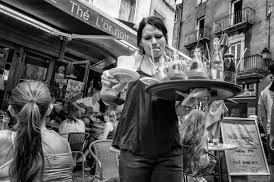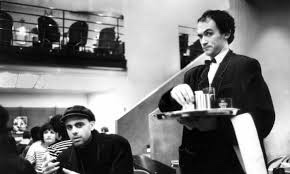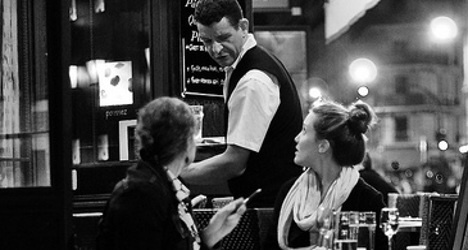I’ve worked in restaurants longer than Tom Brady’s played professional football. I’ve certainly contemplated retirement over the years more seriously than Brady, but now we’re both retired (Update: Tom already un-retired). I can remember countless conversations with coworkers exchanging fantasies about getting out of the industry. Restaurant work is quicksand for some of us, and a resume with only restaurant experience can make it challenging to liberate yourself.
For the greater part of two decades, I’ve tried desperately to nurture my creative self while soldiering through the grind of putting food and drinks on strangers’ tables. Working full-time in a restaurant, even when it was lucrative, has often deflated these ambitions.
I could never have predicted my restaurant career would end in forced retirement. The pandemic cost me my job, but I was already feeling disenfranchised from the industry. Like many others, my time away from restaurant work over the past two years—however impoverishing—has restored my sanity. As a newly sane person, I could never return to working in restaurants if it means accepting the old onerous terms.

While it’s hard to blame every owner for mass lay-offs, the relationships that many service industry professionals had with their former employers were already tenuous before we were let go. It was almost comical that we were expected to return to our jobs no questions asked after being disposed of so unceremoniously. The “nobody wants to work anymore” narrative trumpeted on financial news and political media was a fabrication promulgated by greedy owners. Most of us would’ve returned to our jobs if there’d been sufficient outreach by our former employers. The longer the pandemic lingered, the harder it became to plan our lives around an uncertain return.
I do miss parts of the job. The adrenaline rush of a busy restaurant is invigorating. Early on in the pandemic, I experienced debilitating fatigue everyday around 4-5 pm, the time an average dinner shift would’ve started. My internal clock was conditioned to slam an espresso and gird my loins for a hectic night. Now my engine is kaput, and I feel like taking naps every evening. As someone who once thrived on the chaos, my featureless life now is both pathetic and wonderful.
Kitchen staff often describe the rapture of being in the weeds. Most cooks prefer busy over slow; they’d rather work harder and faster than languish behind the line. Battling through the elements and weathering the storm is how cooks earn their stripes. It can become addicting. Restaurant people need constant stimulation to stay fueled. We thrive off the kinetic energy.
I miss the camaraderie of a staff, the sense of common purpose. The way it forces you to never be lonely. Restaurant work teaches you to coexist and be productive with people even when you have nothing in common. You forge deep bonds through shared endurance. Even when team members despise each other, they still have each other’s backs when the first table is seated. We put our vendettas aside in service of a smooth and lucrative shift.
What I don’t miss? Having to overcompensate for the gracelessness of guests. A party that’s impossible to please—whether they’re sending food back, complaining about the music, or demanding a different table—always makes it harder to keep the deserving people happy. I’ve so often struggled to adequately care for a full section of tables because one group among them is behaving boorishly. The apprehensiveness toward enforcing common decency makes staff unduly timid, especially in fine dining settings where entitled guests think that spending exorbitant sums excuses lack of social graces.
Restaurants focus on miscues because they strive for perfection. But if failures are scrutinized, successes must also be celebrated. Sadly, praise is scant. A restaurant staff is too often judged by its least satisfied customers, when the least satisfied people in your restaurant are often the most miserable people to begin with. It’s ridiculous to expect a staff of trained hospitality professionals to shoulder the burden of other people’s misery. Under constant duress and unable to rebuke ornery guests, a restaurant staff often takes out its frustration on each other.

Two years into a once-in-a-generation public health crisis, the job has never been more difficult. Even before the masks and vaccine checks, making people happy was already more challenging than ever. Great hospitality is to welcome people and show them a good time, not to counteract their proclivity for disliking things, including masks and vaccines. I’ve taken care of so many tables in my career where I’m certain that nothing I or my teammates could’ve done would’ve made them happy. Nothing. Many of us learn to predict the meritless complaints before they happen, but that doesn’t always mean we can forgive ourselves when guests leave disappointed. The industry needs to change this mindset.
Leaving restaurants has made me have second thoughts about its existential purpose. Especially the fine dining sector which has become an oligarchy, contributing virtually nothing to society other than to make affluent people feel more important than they are. The pandemic has put a chokehold on independent restaurant businesses, and the public seems ambivalent to the casualties piling up, including treasured fixtures of their communities. It speaks to how desensitized we’ve become to the decay in the dining landscape and to how much our appreciation for great restaurants has eroded over the years. The idea of a “ghost kitchen” alone should be Freddy Kruger-style horrifying, but it isn’t because we’ve spent years becoming further and further removed from the people that cook our our food.
We’ve become more selfish patrons, approaching restaurant visits as pure hedonism. But restaurants don’t exist purely to please us. They stand as pillars of the community—no different than churches, schools, and park districts. But so little is expected of restaurant customers besides their money. Our relationship with restaurants has become increasingly platonic, leaving businesses feeling unsupported and struggling for survival. As a restaurant owner, if you pivot your business enough times, you end up going around in a circle. Meanwhile, restaurant food has become just another convenience like dropping off the dry cleaning or hiring a dog-walker.
This is why I can’t participate anymore. If the pandemic has shown us anything, it’s how much the social fabric of our communities is torn when we lose access restaurants. Absence should make the heart grow fonder. But it hasn’t. Independent restaurants are closing at alarming rates, Congress is still dragging its feet on desperately needed aid, and the market caps of multinational restaurant companies like the parents of Applebee’s and Olive Garden are trading at all time highs. Is this the dystopian future people want? I honestly have no idea who these people are, but I definitely know I don’t want to serve them anymore.


This appreciation is in regard to a very beautiful tribute that you wrote to honor Gina dePalma and her unpublished (lost? Really?) book. I only came to know of her this morning over an olive oil cake that I attempted, bleary eyed on too little sleep. When I tasted it’s delicious warm crumb, I went back to read the intro to the recipe and was smitten by Gina and her writing. Alas, I soon found out that she has left us. Sadly, I read more about her until I stumbled upon your online article. Your respect and admiration for Gina… Read more »
This was honestly beautiful. Thank you for taking the time to write this.